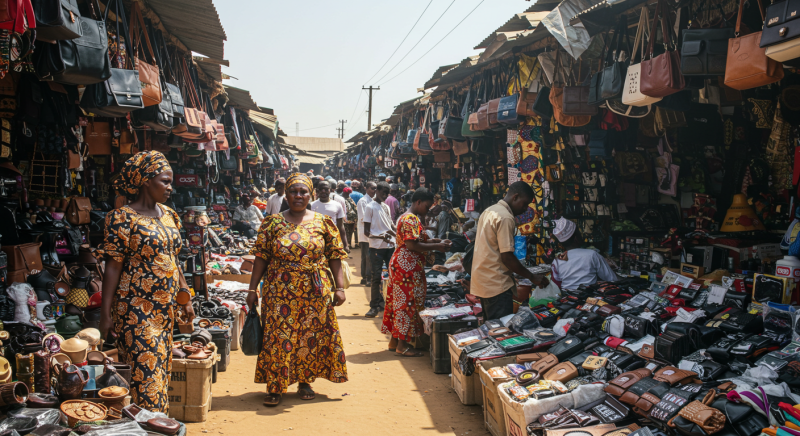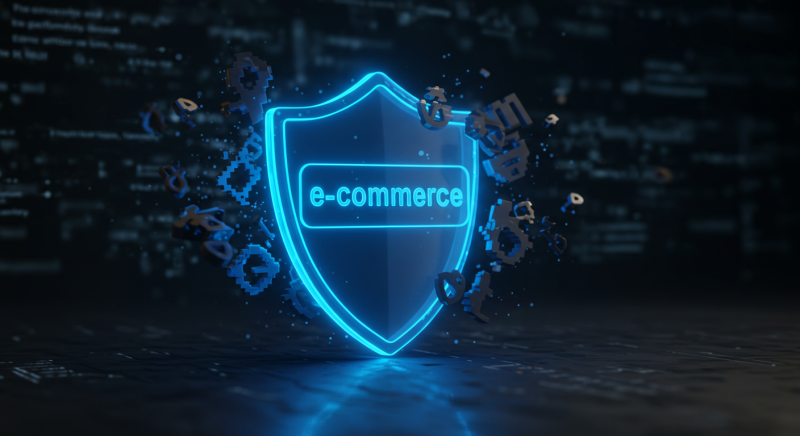Imagine pouring years of sweat and creativity into building your online store, only to wake up one morning and find a competitor selling counterfeit products under your brand name. For Adeola, a Lagos-based entrepreneur, this nightmare became reality when her handmade skincare line was hijacked by a fraudulent seller on a popular Nigerian e-commerce platform. Her story is not unique. With Nigeria’s e-commerce sector projected to hit $75 billion in revenue by 2025, the race to protect brands has never been more urgent.
Key Takeaways
-
Nigeria’s e-commerce boom is fueling trademark infringement risks, with counterfeit goods threatening brand integrity.
-
Trademark registration through the Nigerian Trademarks Registry grants legal exclusivity and enforcement power.
-
Proactive strategies like digital monitoring and legal partnerships are critical for safeguarding online brands.

Why Trademark Protection for Nigerian Online Marketplaces Matters
Nigeria’s digital economy is experiencing an unprecedented boom, with online marketplaces driving innovation, employment, and cross-border trade. However, this rapid growth has a darker side: an alarming surge in trademark infringement and counterfeit operations.
Recent industry reports reveal that over half of Nigeria’s e-commerce merchants face challenges related to brand impersonation, with fake listings eroding consumer trust and diverting revenue from legitimate businesses. In this high-stakes environment, trademark protection for Nigerian online marketplaces isn’t merely a legal safeguard—it’s the cornerstone of sustainable growth in a competitive digital landscape.
The consequences of neglecting trademark protection for Nigerian online marketplaces are severe. Unscrupulous sellers exploit weak enforcement systems to clone popular brands, flooding platforms with substandard products. A 2024 survey found that 63% of Nigerian consumers accidentally purchased counterfeit goods online, often mistaking them for authentic items. These incidents don’t just harm buyers; they tarnish reputations that entrepreneurs spent years building.
For instance, a thriving Abuja-based electronics retailer saw sales plummet by 40% after counterfeiters replicated their brand name to sell faulty power banks. Without trademark protection, businesses lack the legal authority to force platforms to remove fraudulent listings, leaving them vulnerable to financial and reputational damage.
Beyond individual brands, the ripple effects of weak trademark protection for Nigerian online marketplaces threaten the entire digital economy. Counterfeit trade undermines investor confidence, stifles innovation, and deprives the government of tax revenue.
Globally recognized platforms like Jumia and Konga are increasingly prioritizing verified sellers with registered trademarks to curb fraud, signaling a shift toward brand accountability. By securing trademark protection, businesses signal credibility, making it easier to attract partnerships, secure loans, and expand into international markets like the AfCFTA bloc.
Moreover, trademark protection for Nigerian online marketplaces empowers entrepreneurs to future-proof their brands. As artificial intelligence tools make it easier for counterfeiters to replicate logos and product descriptions, a registered trademark serves as an immutable digital fingerprint.
It enables brands to leverage anti-counterfeiting technologies, such as blockchain-based verification systems, which are becoming standard on major platforms. Proactive trademark registration isn’t just about defense—it’s about positioning Nigerian businesses to lead in Africa’s $75 billion e-commerce revolution while fostering a culture of authenticity and consumer safety.
In essence, trademark protection for Nigerian online marketplaces bridges the gap between entrepreneurial ambition and long-term success. It transforms brands from vulnerable targets into shielded entities capable of scaling sustainably. As Nigeria’s digital marketplace evolves, securing this protection isn’t an option—it’s the bedrock of survival and growth in an era where brand identity is both a currency and a shield.

Step-by-Step Guide to Trademark Protection for Nigerian Online Marketplaces
Navigating trademark protection for Nigerian online marketplaces requires a strategic approach to ensure your brand stands guard against infringement while complying with local regulations. Below is a detailed roadmap to secure your intellectual property in Nigeria’s fast-evolving e-commerce ecosystem.
1. Understand the Legal Framework
Trademark protection for Nigerian online marketplaces begins with mastering the legal foundations. The Trademarks Act (2004) and Merchandise Marks Act form the backbone of brand protection, defining rights, infringement penalties, and registration protocols. For digital businesses, Class 35 of the Nice International Classification is indispensable, as it covers advertising, business management, and online retail services—the lifeblood of e-commerce platforms. Non-traditional marks, such as logos, slogans, and even distinct packaging designs, qualify for registration. However, generic terms like “Fast Delivery Services” or geographically descriptive names risk rejection. By aligning your application with these laws, you lay the groundwork for enforceable trademark protection for Nigerian online marketplaces. Nigerian Trademarks Registry.
2. Conduct a Comprehensive Trademark Search
Skipping a trademark search is like launching a website without checking domain availability—risky and potentially costly. Trademark protection for Nigerian online marketplaces hinges on ensuring your brand name, logo, or tagline isn’t already claimed. The Nigerian Trademarks Registry’s database, though evolving, is the primary tool for uncovering conflicts. Recent data shows that nearly one-third of disputes arise from overlooked similarities with existing marks. For example, a Lagos-based fashion startup nearly lost its brand identity after discovering a rival had registered a nearly identical name six months prior. Advanced search tools now incorporate AI to analyze phonetic and visual similarities, reducing the risk of future legal battles.
3. File Your Application Through an Accredited Agent
Foreign and local businesses alike must partner with a registered Nigerian trademark agent to submit applications—a non-negotiable step in securing trademark protection for Nigerian online marketplaces. Required documents include a signed Power of Attorney, a high-resolution digital image of the mark, and a detailed list of goods or services. Opting for electronic filings accelerates the process, with acknowledgments issued within a day. While costs vary, budgeting between 1,000 covers government fees and legal support. Delays often stem from incomplete forms or vague product descriptions, so precision is key. For instance, specifying “online retail of beauty products via a mobile app” strengthens your claim compared to a generic “e-commerce services.” Kabbiz Legal.
4. Navigate Examination and Publication
Once submitted, the Trademarks Registry scrutinizes your application for distinctiveness and compliance. If approved, your mark enters a two-month opposition phase published in the Nigerian Trademarks Journal. Approximately 12% of applications face opposition, often from competitors alleging brand confusion. Proactive trademark protection for Nigerian online marketplaces demands preparing for this phase—gathering evidence of prior use or brand recognition can counter challenges. A recent case saw a Calabar-based agro-exporter successfully defend their trademark by presenting social media engagement metrics and customer testimonials as proof of brand equity.
5. Enforce Your Trademark Rights
Registration is just the first battle; enforcement secures trademark protection for Nigerian online marketplaces. Monitoring platforms like Jumia, Konga, and Instagram shops for counterfeit listings is critical. Automated tools scan product descriptions and images, flagging suspicious activity in real time. When violations occur, swift action—such as cease-and-desist notices or takedown requests—protects your market share. For persistent infringers, filing a lawsuit at the Federal High Court can yield injunctions or damages. In 2024, a Nigerian skincare brand recovered ₦200 million in lost revenue after courts ruled in their favor, setting a precedent for aggressive enforcement.
Future-Proofing Your Trademark Strategy
As AI-generated content and deepfake technology complicate counterfeit detection, trademark protection for Nigerian online marketplaces must evolve. Integrating blockchain-based authentication systems allows customers to verify product origins via QR codes, while defensively registering domain variants (.ng, .com.ng) blocks cyber-squatters. Collaborating with e-commerce platforms to join verified seller programs also adds layers of defense, ensuring your brand remains synonymous with authenticity in Nigeria’s booming digital marketplace.
By methodically following these steps, businesses transform trademark protection for Nigerian online marketplaces from a bureaucratic task into a competitive advantage. It’s not just about legal compliance—it’s about building a resilient brand capable of thriving in Africa’s next-generation digital economy.

Combating Counterfeits in Nigeria’s Digital Economy
The rapid digitization of Nigeria’s economy has unlocked immense opportunities for entrepreneurs, but it has also emboldened counterfeiters who exploit lax enforcement and emerging technologies to flood online marketplaces with fake goods. Trademark protection for Nigerian online marketplaces is no longer just a legal formality—it is a critical shield against sophisticated counterfeit networks that threaten brand integrity, consumer safety, and national economic growth.
One of the most pressing challenges lies in the evolving tactics of counterfeiters. Advances in artificial intelligence and 3D printing enable them to replicate product designs, packaging, and even brand logos with alarming precision.
For instance, counterfeiters now use AI-generated images to mimic authentic product listings, making it nearly impossible for consumers to distinguish genuine items from fakes. This technological arms race underscores the urgency for businesses to adopt proactive trademark protection strategies tailored to Nigeria’s digital economy.
A cornerstone of these strategies is defensive domain registration. Securing multiple domain extensions such as .ng, .com.ng, and .africa prevents cyber-squatters from hijacking brand names to sell counterfeit goods. Trademark protection for Nigerian online marketplaces gains strength when businesses control their digital footprint, ensuring customers are directed only to official platforms.
A recent case involved a Lagos-based electronics brand that reclaimed over a dozen fraudulent domains after implementing a defensive registration strategy, effectively shutting down imitation sites.
Another game-changing tool is blockchain authentication. By embedding blockchain-powered QR codes or NFC chips into products, businesses create an immutable record of ownership and origin. Consumers can scan these codes to verify authenticity, while brands gain real-time insights into supply chain vulnerabilities.
For example, a Nigerian luxury skincare company reduced counterfeit sales by 70% after introducing blockchain verification, reinforcing trust in their trademark-protected online marketplace presence.
Collaboration with e-commerce platforms is equally vital. Major players like Jumia and Konga are increasingly partnering with brands to streamline the reporting and removal of counterfeit listings.
Trademark protection for Nigerian online marketplaces becomes actionable when businesses join verified seller programs, which prioritize authenticated brands in search results and penalize unauthorized sellers. Proactive monitoring tools, such as AI-driven image recognition software, can scan thousands of listings daily, flagging potential infringements for rapid takedown.
Legal enforcement remains a pillar of anti-counterfeit efforts. Registering a trademark grants businesses the legal authority to pursue litigation against counterfeiters, seek injunctions, and claim damages. Nigerian courts have recently demonstrated a stronger stance, with rulings mandating platforms to disclose seller identities in infringement cases. This shift empowers brands to hold counterfeiters accountable, transforming trademark protection for Nigerian online marketplaces from a reactive measure into a deterrent.
Consumer education completes the puzzle. Brands that invest in awareness campaigns—such as social media tutorials on spotting fakes or loyalty rewards for verified purchases—build informed customer bases that actively reject counterfeits. When consumers prioritize authenticity, counterfeiters lose their market foothold, creating a safer ecosystem for trademark-protected businesses to thrive.
In Nigeria’s fast-evolving digital economy, the fight against counterfeits demands innovation, collaboration, and relentless enforcement. By integrating defensive registrations, blockchain verification, platform partnerships, and consumer education, businesses can fortify their trademark protection strategies. This multi-layered approach not only safeguards revenue and reputation but also positions Nigerian online marketplaces as trusted hubs for authentic commerce, driving sustainable growth in Africa’s booming e-commerce landscape.

FAQs: Trademark Protection for Nigerian Online Marketplaces
Q: How long does trademark registration take in Nigeria?
A: 6–12 months if unopposed. Opposed cases may extend to 18 months.
Q: Can I trademark a business name and logo separately?
A: Yes. Separate applications ensure broader protection.
Q: Does a Nigerian trademark cover other African countries?
A: No. Nigeria isn’t part of the Madrid Protocol, so protection is territorial.
Q: What penalties apply to counterfeit sellers?
A: Offenders face fines up to ₦1 million and imprisonment under the Counterfeit and Fake Drugs Act.
Conclusion
As Nigeria’s e-commerce sector surges, trademark protection for Nigerian online marketplaces is no longer optional—it’s a strategic imperative. By registering your brand, leveraging technology for monitoring, and enforcing rights decisively, you shield your business from costly disputes and build a legacy of trust. Start your trademark journey today, and ensure your brand thrives in Africa’s digital future.
read more
How to Start a Tech Career in Nigeria: A Beginner’s Guide to High-Paying Jobs
External Resources
